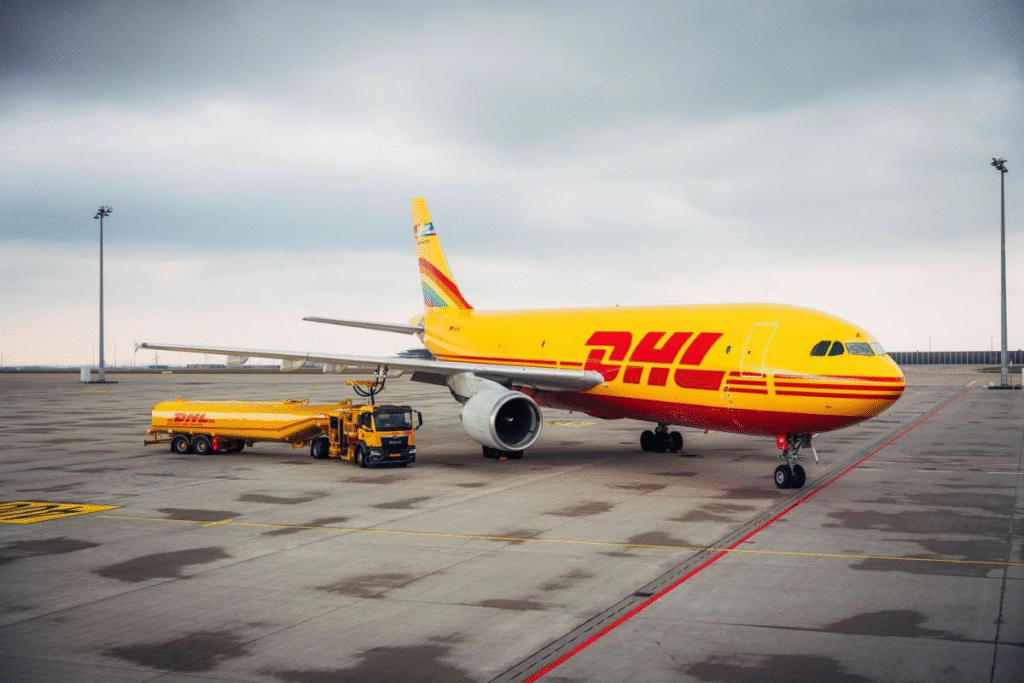DHL to Resume Global Shipments Over $800 to U.S. Consumers After Temporary Suspension
DHL announced Monday that it will immediately resume global shipments from businesses to American consumers for goods valued at more than $800. This decision comes after the company had temporarily suspended such shipments earlier this month due to changes in U.S. customs regulations that created significant disruptions across the logistics industry.
The suspension, which began on April 21, was a response to a new U.S. Customs and Border Protection (CBP) policy that significantly lowered the threshold requiring formal customs entry. Previously, shipments valued up to $2,500 could be cleared informally, but under the new rule, any shipment worth more than $800 must go through formal customs processing.
The company said the new regulation caused a major increase in the volume of shipments needing more detailed and time-consuming inspections, placing strain on DHL’s capacity to process them efficiently.
Since then, DHL has been actively working to expand its customs clearance operations and strengthen its ability to handle the increased load.
According to the company’s statement on Monday, it also engaged in “constructive dialogue” with U.S. authorities, including officials from the Department of Commerce, to find ways to ease the pressure brought on by the regulatory change.
“Adjustments to U.S. The resumption is effective immediately, allowing businesses around the world to once again send higher-value goods to American buyers without delay.
The disruption in DHL’s operations earlier this month highlighted broader issues facing international logistics and e-commerce amid tightening U.S. trade policies. Companies like DHL, which specialize in moving goods quickly across borders, were particularly vulnerable to sudden regulatory shifts that impact how shipments are processed upon arrival.
The customs rule change was part of a broader shift in U.S. trade policy, intended to enhance border security and ensure accurate collection of tariffs and taxes. By lowering the threshold for formal customs entry to $800, U.S. authorities aimed to reduce potential abuses of the previous de minimis rule, which allowed goods valued at $2,500 or less to enter the country with minimal scrutiny.

However, critics argue that the abrupt change created significant logistical bottlenecks, slowing down deliveries for consumers and burdening businesses with additional paperwork and costs. Small and medium-sized businesses, particularly those relying on cross-border e-commerce, were among the hardest hit.
DHL’s announcement provides much-needed relief for many international sellers and American consumers alike, who had faced uncertainty about when the company would reinstate full service.
The impact of customs regulation changes was not limited to DHL. Other entities have also been forced to adjust. For instance, Hong Kong’s postal service announced earlier this month that it would suspend handling packages to and from the U.S. The Hongkong Post cited the expiration of the so-called de minimis exception as the primary reason. This exemption, which had allowed shipments valued under $800 to bypass tariffs, will officially end on May 2.
The policy shift is part of a broader effort by the U.S. government to crack down on what it views as loopholes that allowed inexpensive, often Chinese-made goods to flood the American market tariff-free. The move is widely seen as targeting major Chinese e-commerce companies such as Temu and Shein, which offer extremely low-priced merchandise to American shoppers.
Temu and Shein, anticipating higher costs due to the expiration of the de minimis exception, have already raised prices on many items sold to U.S. consumers. These platforms, which source most of their goods directly from manufacturers in China, relied heavily on the de minimis threshold to keep prices low and compete aggressively in the U.S. market.
The expiration of the de minimis exemption, combined with the tightening of customs processing requirements, represents a significant shift for the cross-border e-commerce industry. Analysts expect these changes to lead to longer delivery times, higher shipping costs, and ultimately, higher prices for American consumers buying international goods.
For DHL, resuming B2C shipments above $800 offers a path back to normalcy, although the company and the industry at large will likely continue to face challenges as the full implications of U.S. customs policy changes unfold.
In its Monday statement, DHL expressed optimism about its ability to adapt to the new environment. The company emphasized that it has expanded its resources and enhanced operational flexibility to better manage the increased demand for formal customs clearances. DHL also said it remains committed to working closely with U.S.
The resumption of services could also help cushion the blow for businesses that rely on DHL’s global network to reach American customers. Many exporters, especially small businesses that ship high-value goods, had scrambled for alternatives during the suspension, often facing higher costs or slower delivery times through other carriers.
For consumers, the restart of DHL’s high-value B2C shipments should restore some confidence and stability in cross-border shopping. However, the broader environment remains uncertain, with continued regulatory changes possible as U.S.
As of now, businesses and consumers are being urged to stay informed about customs policies and work closely with shipping providers to ensure compliance with new regulations. DHL, for its part, pledged to continue providing updates and support to its customers as needed.
Government’s changes to customs rules — including the end of the de minimis exception — will become clearer. For now, the resumption of DHL’s services marks a critical step toward restoring smoother international commerce between businesses abroad and consumers in the United States.
